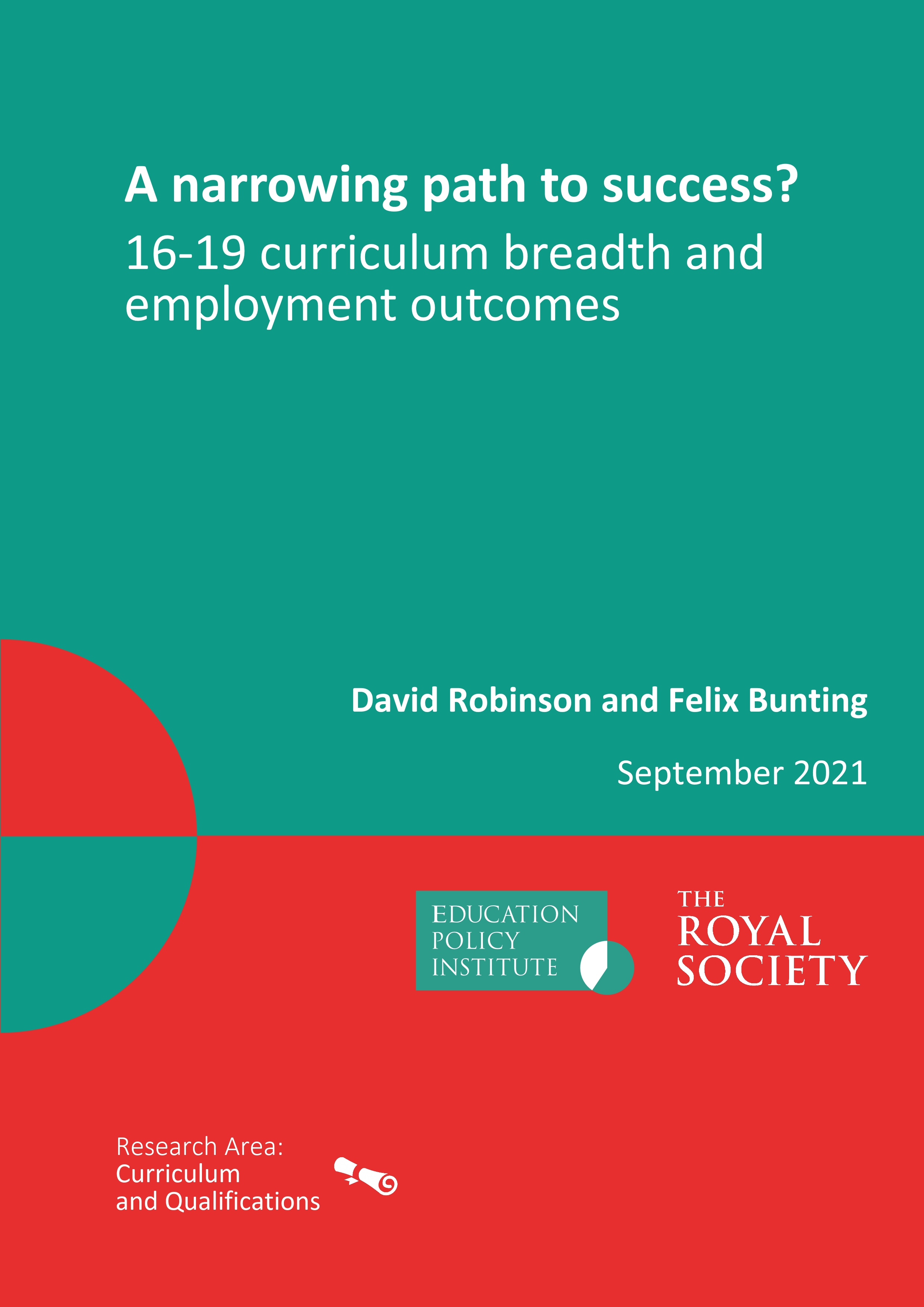A new EPI report, commissioned by the Royal Society, finds that the proportion of students with A and AS levels or equivalent covering at least three of the main subject groups such as humanities, sciences, maths and languages, has now halved since 2010.
England already has one of the narrowest curricula in the developed world, with few other rich countries forcing learners to specialise in a small set of subjects from the age of 16.
The new report shows that this uniquely narrow offer is becoming narrower still, with students increasingly unlikely to take a mix of subjects. The average student now takes subjects from fewer than two of the main subject groups.
Despite these wider trends, when examining the employment outcomes of hundreds of thousands of graduates, the study finds that those who had greater diversity in their A level subjects were likely to see a small boost to their earnings during their mid-twenties; gains which are then expected to be sustained throughout their careers.
After controlling for student prior attainment and other factors, the impact of studying a greater range of subjects at A level is shown to have a similar effect on early career salaries to factors such as the university attended by a student or their socio-economic background.
The research also reveals those groups of students who are more or less likely to study a broader range of subjects. Students who perform well at GCSE are far more likely to go on to study a greater mix of subjects at A level. Conversely, disadvantaged students are much more likely to narrow their choices.
Students from Chinese and Indian backgrounds are shown to study the broadest range of A level subjects, while Black Caribbean and Gypsy/Roma students study the narrowest range.
Reforms introduced by the government around 2013, such as the decoupling of AS and A2 levels, are likely to have contributed significantly to the narrowing of A level choices seen today.
The fall seen in funding for 16-19 education also seems to have played an important role. Falls in real terms funding for sixth forms and colleges since 2010 may have led to fewer qualifications being taken, which in turn have contributed to narrower student choices.
To prevent a further narrowing of 16-19 education, the report calls on government to undertake a wholesale review of 16-19 funding, including reducing cuts, offering more targeted support for disadvantaged students, and ensuring that the funding system no longer discourages the take up of smaller qualifications, such as AS levels.
The full report can be accessed here.
Key findings from study
Students’ A level subject choices are now the narrowest they have been since 2010
- The proportion of students with qualifications spanning three or more of the five main subject groups (sciences, maths, languages, humanities, vocational) has halved since 2010. In 2010, 38% students took A levels or equivalent covering 3 or more of these groups, but by 2019, just 17% did.
- The majority of this decline in subject diversity took place between 2016 and 2019, with a 14-percentage point fall over that period.
- Since 2017, the average student has taken subjects from fewer than two subject groups. Only 1 in 100 students now takes A levels or equivalent from 4 or more subject groups, down from almost 1 in 10 in 2010.
This appears to be driven by reforms to A levels, including the decoupling of AS levels
- Reforms in 2013 which meant that AS levels, typically taken in year 12, no longer counted towards final A level grades, meant that an increasing number of students are no longer taking AS levels.
- This has led to an overall fall in the number of qualifications taken, leading to reduced subject diversity, as well as less teaching time. The average number of qualifications taken fell by 43% between 2016 and 2019, from five to three.
Real terms funding cuts have also contributed to the narrowing of A levels
- Since 2010, 16-19 education (sixth forms and colleges) has seen significant real terms funding reductions. The latest figures covering much of this period show that funding per student fell by 16% between 2012 and 2019.
- Falls in real terms funding since 2010 have led to fewer qualifications being made available, which in turn contributed to narrower student choices.
- The 16-19 funding formula, which funds sixth forms and colleges to deliver their programmes, also plays a role, by providing no incentives to offer an AS level alongside their main three A levels.
Greater subject diversity leads to higher earnings for students during their mid-twenties
- While much of the difference in earnings associated with a wider range of subjects can be explained by higher student attainment, when accounting for this, graduates who had taken A levels from two or more subject groups earned around 3-4% more in their early careers than those taking qualifications from only one subject group.
- After controlling for prior attainment and other characteristics, this difference is comparable in effect to factors such as the university attended by a student or their socio-economic background. Such salary gains would be expected continue to grow during individuals’ thirties and forties.
The narrowing of A levels could leave students poorly equipped for the workplace
- Given the career gains from greater subject diversity at A level, those students taking a narrower range of subjects risk being at a disadvantage to their peers.
- A broader set of skills is likely to help individuals’ transition into a broader set of jobs, by opening up opportunities in different sectors or following unemployment. Such students may also be able to better withstand any significant changes to the labour market in the future, such as those resulting from technological change.
Certain pupils are more likely to take a narrower set of A levels
- Those who perform well at GCSE are more likely to study a diverse set of subjects: students with an average of a standard pass (grade 4) in GCSE English and maths take A levels from one subject group, while students with a grade 7 at GCSE or above take A levels from two or more areas.
- Disadvantaged students and those with special educational needs are much more likely to take a narrower set of subjects.
- Students from Chinese and Indian backgrounds are shown to study the broadest range of subjects, covering around 2 subject groups on average, while Black Caribbean and Gypsy/Roma students study the narrowest range, covering 1.5 subject groups.
The government should review its funding offer to avert any further narrowing
- The government should undertake a wholesale review of 16-19 funding, including reducing funding cuts, offering more targeted support for disadvantaged students, and ensuring that the 16-19 funding formula does not discourage the take up of smaller qualifications, such as AS levels.
This report is commissioned by the Royal Society.
The Royal Society is the national academy of science for the UK. Its Fellows include many of the world’s most distinguished scientists working across a broad range of disciplines in academia, industry, charities and the public sector. The Society draws on the expertise of the Fellowship to provide independent and authoritative advice to UK, European and international decision makers.



